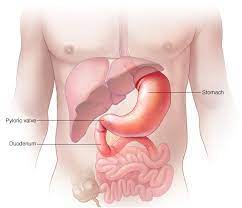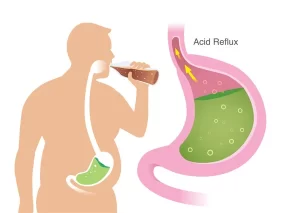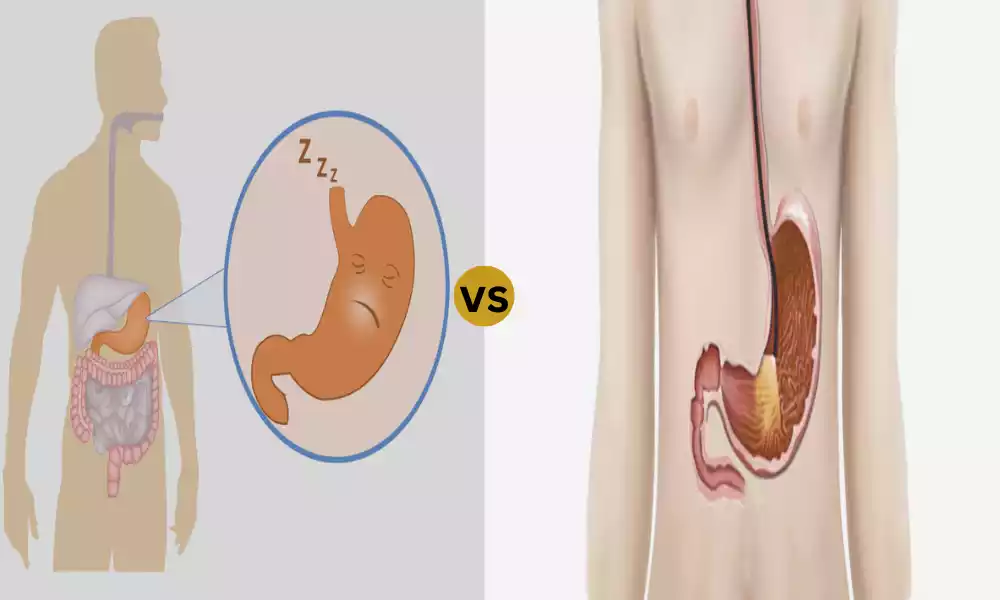What is the Difference Between Gastroparesis and Dumping Syndrome
Introduction of Gastroparesis and Dumping Syndrome
Gastroparesis and Dumping Syndrome can be a condition that manifests because of slow gastric emptying while dumping syndrome results from an increased intake of food into a small bowel.
Gastroparesis is a disorder of digestion caused by a delay in stomach emptying that can trigger symptoms like nausea and vomiting, satiety that is not as full, and abdominal discomfort.
It’s often linked to diseases like diabetes, post-surgical complications, or Diagnostic evaluations including clinical and gastric emptying tests Treatments may involve diet changes, medication, or surgery in more severe instances.
Dumping Syndrome is caused by an excessive emptying of the stomach to the small intestine. This is usually occurring following certain gastric surgery. The symptoms include a feeling of satiety that is not apparent until the beginning of the diarrhea, abdominal pain, and lightheadedness.
The diagnosis is based on a clinical examination and tests to determine glucose tolerance. Treatment focuses on changes to diet including avoiding simple carbohydrates and sugars and also medications.
What is Gastroparesis?
Gastroparesis can be described as a long-lasting digestive condition that is characterized by a delayed emptying of the stomach, which results in an impaired flow of food items from the stomach into the small intestinal.
The condition can disrupt the normal digestive process and can cause a variety of unpleasant symptoms. The most common symptoms are nausea and vomiting and rapid satisfaction (feeling filled rapidly) as well as bloating and abdominal pain.

Gastroparesis may be triggered by a variety of causes including diabetes, which is among the more frequent associated conditions. Other causes are neurologic disorders following surgery, post-surgical complications, or idiopathic triggers.
The process of diagnosing Gastroparesis requires a clinical examination which includes a medical history, physical exam, and gastric emptying tests that help determine the frequency of food passing through the stomach.
Treatment options may include diet changes, like eating smaller meals, with fewer frequent intervals and avoiding high-fat, high-fiber food items, in addition to medication to treat symptoms and increase gastric mobility.
In extreme instances, surgical procedures such as feeding tubes or gastric pacemakers might be considered to improve the quality of life of patients. The correct diagnosis and management are vital for those suffering from Gastroparesis to reduce symptoms and avoid complications.
What is Dumping Syndrome?
Dumping Syndrome is an intestinal disorder that normally is seen following certain kinds of gastric surgery such as gastric bypass, or possibly partial gastric surgery. The cause is the rapid dumping of digested food items from the stomach to the small intestine. There are two types: early dumping as well as late-dump syndrome.

Dumping that occurs early, which generally occurs between 15 and 30 minutes after eating, causes symptoms such as nausea, abdominal cramps diarrhea, and lightheadedness.
Later dumping, which occurs within 1-3 hours after eating is often marked with hypoglycemia (low glucose levels) symptoms such as sweating, fatigue, and palpitations.
The rapid inflow of unabsorbed food and sugars to the small intestine can trigger an unusual increase in insulin production, which causes these symptoms. The diagnosis is based on an assessment of the patient’s condition along with glucose tests.
Treatment is based on dietary adjustments which include avoiding sugary and simple carbohydrate-rich meals and eating smaller, more regular meals, as well as laying on the floor after a meal.
The use of medications and lifestyle modifications could also be suggested to relieve symptoms and increase the general health of the patient.
Symptoms and Causes of Gastroparesis
Causes:
- Type 1 Diabetes: Most often, type one diabetes is associated as a result of damage to the vagus nervous system which affects the stomach muscles’ contractions.
- Post-Surgical Complications: Some abdominal procedures, including weight loss surgery or esophageal surgeries, may result in gastroparesis.
- Viral Infections: Certain viral infections that affect your stomach or digestive tract may cause gastroparesis.
- Medical Treatments: Specific medications, especially those that affect the nerve system, may slow down the process of emptying gastric.
- Neurological System Disorders: Disorders like multiple sclerosis or Parkinson’s disease could influence the nerves that control stomach muscles.
Symptoms:
- Nausea and vomiting: Frequent episodes of nausea and vomiting, mainly following meals.
- Feeling full quickly: Early satiety, gives you the feeling of fullness after eating only a small portion of your food.
- Abdominal Bloating and Pain: Pain, discomfort, and abdominal gastric bloating.
- Acid Reflux: Symptoms of gastroesophageal reflux disease (GERD) include regurgitation and heartburn.
- Changes of Blood Sugar: Difficulty in controlling your blood sugar level, especially in people who suffer from diabetes.
- Inability to eat: Decreased desire to consume food due to discomfort symptoms.
- Insufficiency: In time, gastroparesis may cause obesity and malnutrition because of the inability to absorb nutrients correctly.
Symptoms and Causes of Dumping Syndrome
Symptoms:
The Early dumping phase (10-30 mins after having eaten):
- Vomiting and Nausea: Intense nausea and frequent vomiting episodes.
- Diarrhea or loose Stools: Rapid, liquid stool movements.
- Abdominal Cramping Abdominal cramps are severe and cause pain.
- “Rapid Heartbeat” (Tachycardia): Significant increase in heart rate.
- Flushing and Sweating Prolonged sweating and flushing of the face.
- Lightheadedness and weakness: Feeling weak and lightheaded.
- The word “fatigue” refers to sudden onset weakness or fatigue.
late Dumping phase (1-3 hours after having eaten):
- Shaking: uncontrollable shaking, trembling, or shaking.
- Sweating A lot of sweating.
- The Rapid Heart Rate The heartbeat is significantly higher.
- Confusing: Mental confusion, or confusion.
- Dizziness is Dizzy, and lightheaded.
Causes:
Dumping Syndrome is usually caused by specific gastric operations that alter the stomach’s anatomy.
This is most often consisting of:
- Gastric Bypass Surgery: This procedure for weight loss involves shrinking in size of the stomach as well as redirecting your digestive tract. The fast movement of stomach contents to the small intestine can trigger Dumping Syndrome.
- Sleeve Gastrectomy: With this method, it is where a part of the stomach is removed which results in a stomach that is smaller. Although it isn’t as frequent as gastric bypass surgery, Dumping Syndrome can still be seen.
Diagnosis and Tests
- Medical History Examining: Your healthcare provider will start with a comprehensive medical history. They will also inquire about your history of surgery and weight loss, in particular any bariatric procedures you have had to undergo, as Dumping Syndrome is often a result of these treatments.
- Evaluating Symptoms: A thorough assessment of your symptoms is essential to determine the diagnosis. Talk about your experiences with late and early vomiting symptoms, which include nausea diarrhea, vomiting as well as rapid heart rate shaking, sweating, and abdominal pain.
- Dietary Habits Your doctor might inquire about your diet and the type of foods you consume since Dumping Syndrome symptoms often occur when you consume high-fat or high-sugar meals.
- Physical Exam: A physical examination could be done to check for any symptoms similar to Dumping Syndrome, such as rapid heartbeat or sweating.
- Oglycose Tolerance Testing (OGTT): In certain instances, it is possible that an OGTT could be carried out. This test requires taking a glucose solution and then your glucose levels will be measured. Individuals suffering from Dumping Syndrome may experience a drastic and rapid reduction in their blood sugar level following the glucose test.
- Gastric Emptying Studies: The study of gastric emptying is a test for specific purposes that aid in the diagnosis of Dumping Syndrome. The test involves you eating food or drink that contains an insignificant amount of radioactive substances.
Management and Treatment
The treatment and management of Dumping Syndrome primarily involves making changes to lifestyle and diet.
Here are some tips and treatments that can help ease symptoms and improve your life quality when you suffer from Dumping Syndrome:
Dietary Modifications:
- Small, frequent meals: Opt for several smaller meals throughout the day instead of three big meals to avoid the rapid emptying of your stomach and blood sugar fluctuations.
- The Balanced Diet Make sure you consume balanced meals that contain proteins as well as complex carbohydrates and healthy fats that help slow digestion.
- Avoid high-fat and sugary food items: Stay away from high-fat and high-sugar foods since they could cause symptoms. Sweets, simple carbs and sweet drinks must be avoided.
- Liquids in between meals: Avoid drinking large quantities of fluids at mealtimes because this could cause stomach contents to be diluted and accelerate the emptying the stomach. It is better to drink liquids during meals.
Lifestyle Changes:
- Rest after eating: Take some time to sit down or rest after eating. This can help to reduce the intensity of symptoms.
- Gradual Reintroduction to Normal Diet Following surgery If Dumping Syndrome occurs as a result, you might be advised to gradually introduce foods and observe your tolerance.
Medications:
- Medicines to slow Gastric emptying: In some cases, medical professionals might prescribe acarbose or other medications, that can slow the process of food moving through the digestive tract.
- Octreotide Injections For cases that are severe and don’t respond to other treatments, octreotide injections could be suggested to control gastric emptying and relieve symptoms.
- Surgery revision: Rarely surgery revision is thought of, particularly when Dumping Syndrome is causing severe complications that are not responding to other treatment options.
Some Common uses of Medications
Here’s a shorter summary of medications used to manage Dumping Syndrome:
- Acarbose and Miglitol: Slow carbohydrate digestion to stabilize blood sugar levels and reduce early dumping symptoms.
- Octreotide: Slows stomach emptying and reduces insulin release, effective for both early and late dumping symptoms.
- Diazoxide: Suppresses insulin release to control blood sugar and alleviate early dumping symptoms.
- Pancreatic Enzyme Replacement Therapy (PERT): Improves nutrient absorption in cases of malnutrition.
- Proton Pump Inhibitors (PPIs): Used to manage acid reflux associated with Dumping Syndrome.
Complications and Long-Term Effects
Complications:
- Insufficiency: A persistent and grave Dumping Syndrome can lead to malnutrition due to the insufficient absorption of nutrients. In time, this may result in nutritional deficiency, weakness, and other health problems.
- Dehydration frequent vomiting and diarrhea resulting from Dumping Syndrome can lead to dehydration when not properly addressed. Dehydration may cause health issues.
- Gastrointestinal Symptoms The presence of continuous symptoms, including abdominal pain and diarrhea, can have a significant impact on the quality of life of a person and general well-being.
- Vitamin as well as Mineral deficiencies: Inadequate absorption of nutrients could cause deficiencies of vital minerals and vitamins, leading to a variety of health problems such as anemia or bone health issues.
- Weight Loss Extreme Dumping Syndrome could lead to unintentional weight loss that could be an issue, especially for those who are overweight or are trying to keep an appropriate weight.
Long-Term Effects:
- Affected Quality of Life: Numerous painful symptoms can result in a diminished quality of life as a result of the restrictions and discomfort they create.
- Chronic Health Issues: Inadequate nutrition and malnutrition can cause long-term health issues and affect various bodily functions.
- Osteoporosis: In the long run, nutritional deficiencies may cause bone loss and increase the risk of developing osteoporosis.
- Cardiovascular Complications: The rapid fluctuations in blood sugar levels, as well as other variables that are associated with Dumping Syndrome, may cause cardiovascular problems.
- psychological impact: The struggle with persistent symptoms and restrictions on diet could result in psychological issues, such as depression and anxiety.
Prevention Strategies
Dumping Syndrome is a possible complication after some gastric surgeries. There are several strategies to prevent it which can decrease the risk of developing this disorder.
Here are some of the most effective prevention strategies:
- Educational and counseling Prior to having any type of gastric surgery, patients must be provided with comprehensive education and counseling regarding the potential risks and complications, which include Dumping Syndrome. Knowing the importance of diet and lifestyle changes following surgery is vital.
- Dietary Modifications Implementing a healthy, balanced diet could assist in preventing the onset of Dumping Syndrome. This means limiting the consumption of high-fat, high-sugar food items and focusing on eating smaller portions of meals that are full of nutrients.
- Proper Post-Surgical Care After gastric surgery following the dietary guidelines recommended by doctors and post-surgical treatment guidelines provided by health care professionals can dramatically lower the risk that you will develop Dumping Syndrome.
- Regular Follow-up Appointments: Schedule regular follow-up appointments with your healthcare doctors to keep track of your improvement and address any possible issues. These appointments enable rapid intervention and adjustments to your treatment regimen, in the event of need.
- Medical Compliance: If medications are required following surgery, make sure to ensure respect for the dosage as well as the schedule. Certain medications may aid in regulating digestion and avoid complications like Dumping Syndrome.
- Exercise: Participating in regular exercise, as suggested by health professionals helps keep your overall health in check and helps to ensure proper digestion.
- Psychosocial support: Seek psychosocial support like support groups or counseling, to tackle any psychological or emotional challenges related to the surgical procedure and subsequent lifestyle modifications.
Conclusion
Dumping Syndrome, which commonly follows gastric surgery, manifests itself both early and late post-meal. Early dumping may include nausea, cramps, diarrhea, and lightheadedness within 15-30 minutes post-meal.
Late dumping leads to hypoglycemia symptoms like sweating and weakness 1-3 hours later as a result of rapid stomach emptying and abnormal insulin release from undigested food.
This disorder requires clinical assessment as well as glucose tolerance tests for diagnosis treatment including dietary modifications, smaller meals, and lifestyle modifications to avoid sugars and simple carbohydrates while managing symptoms and improving quality of life.


